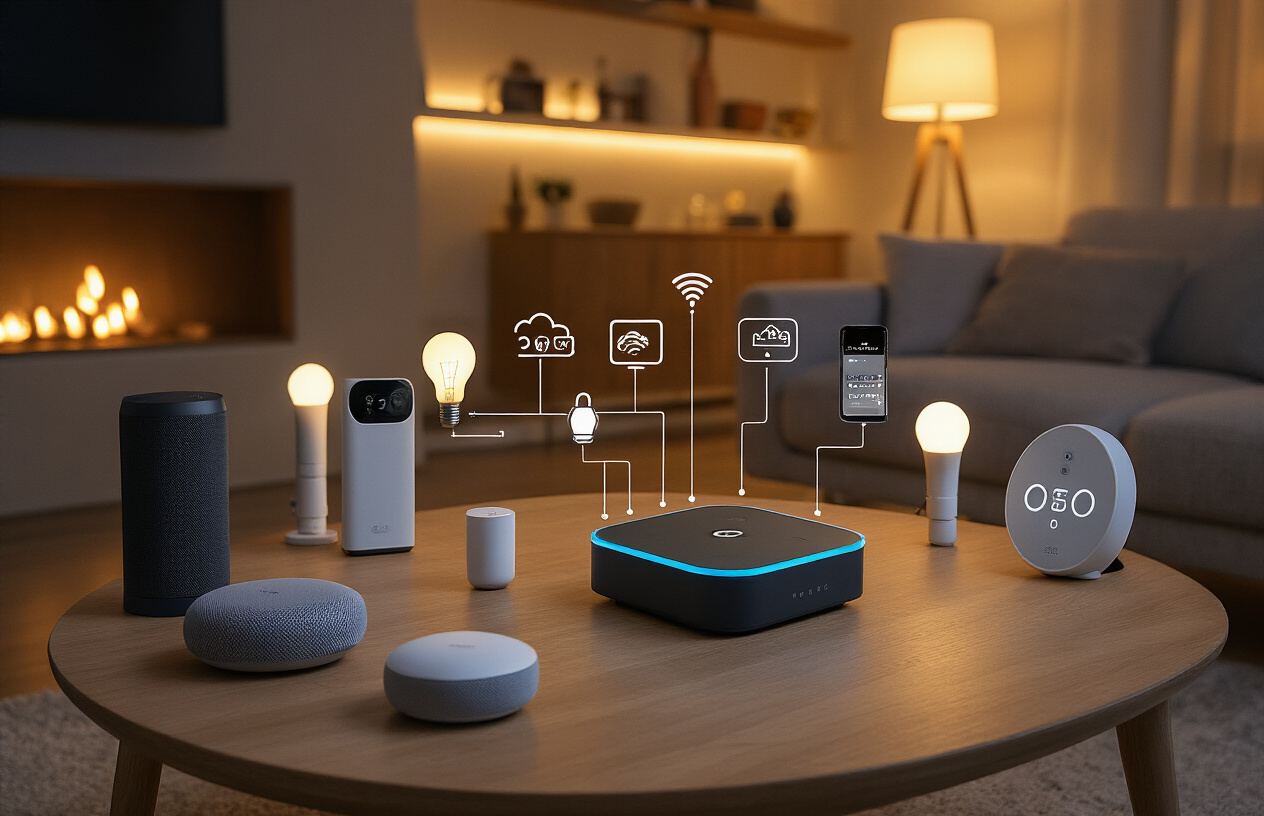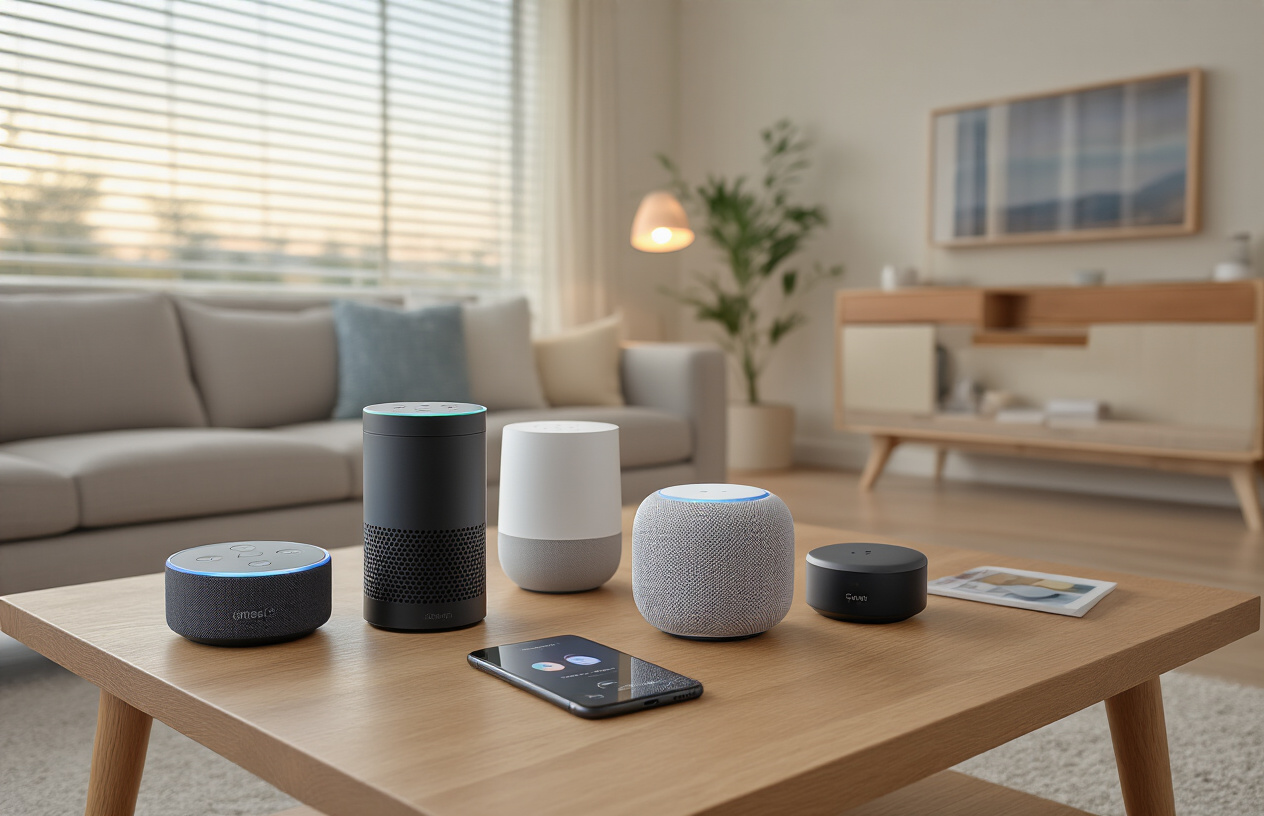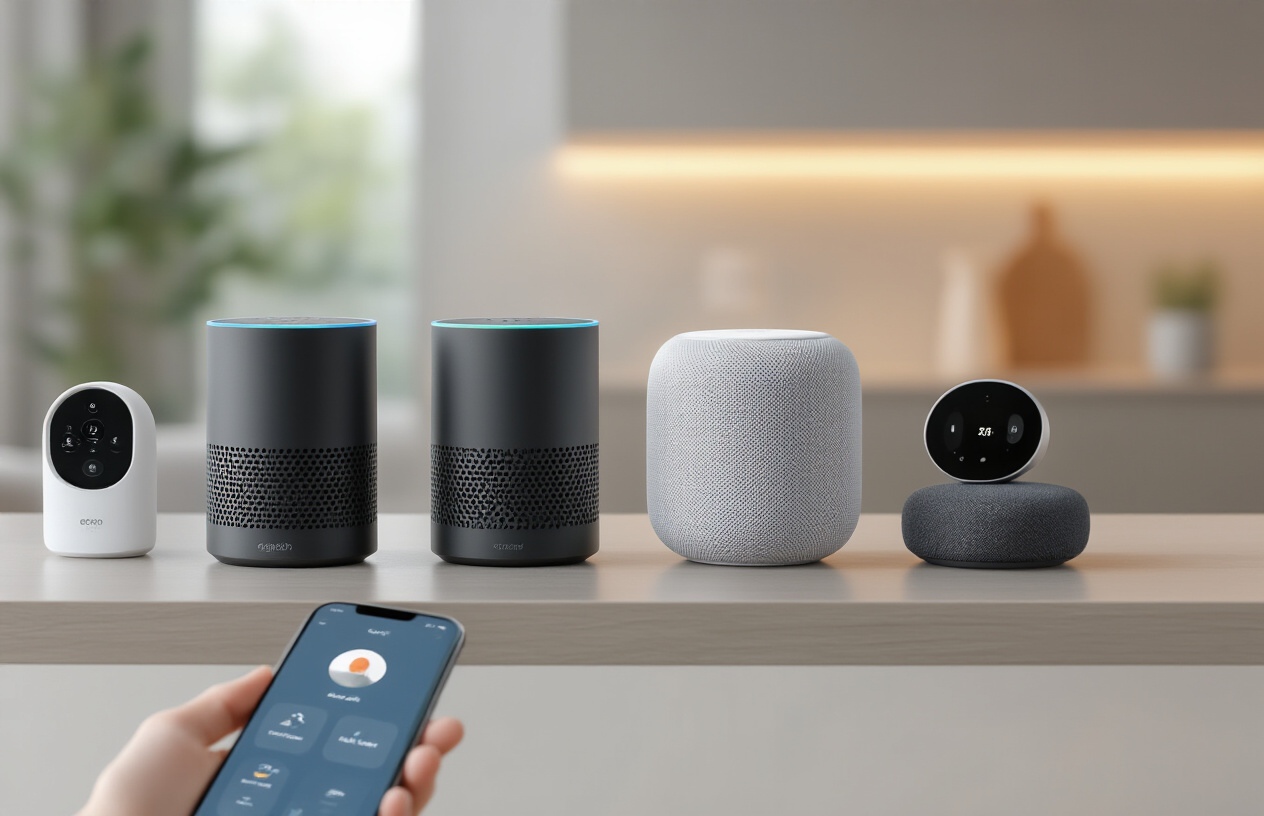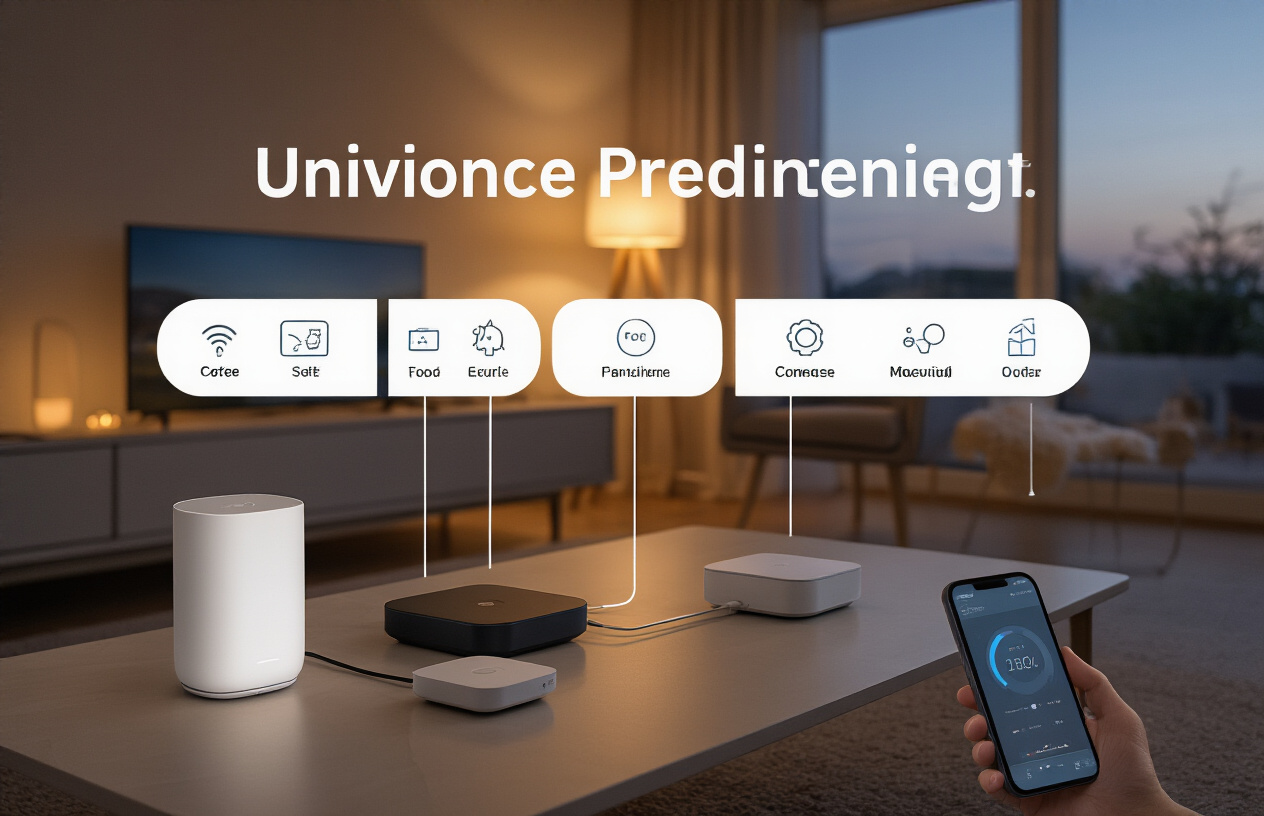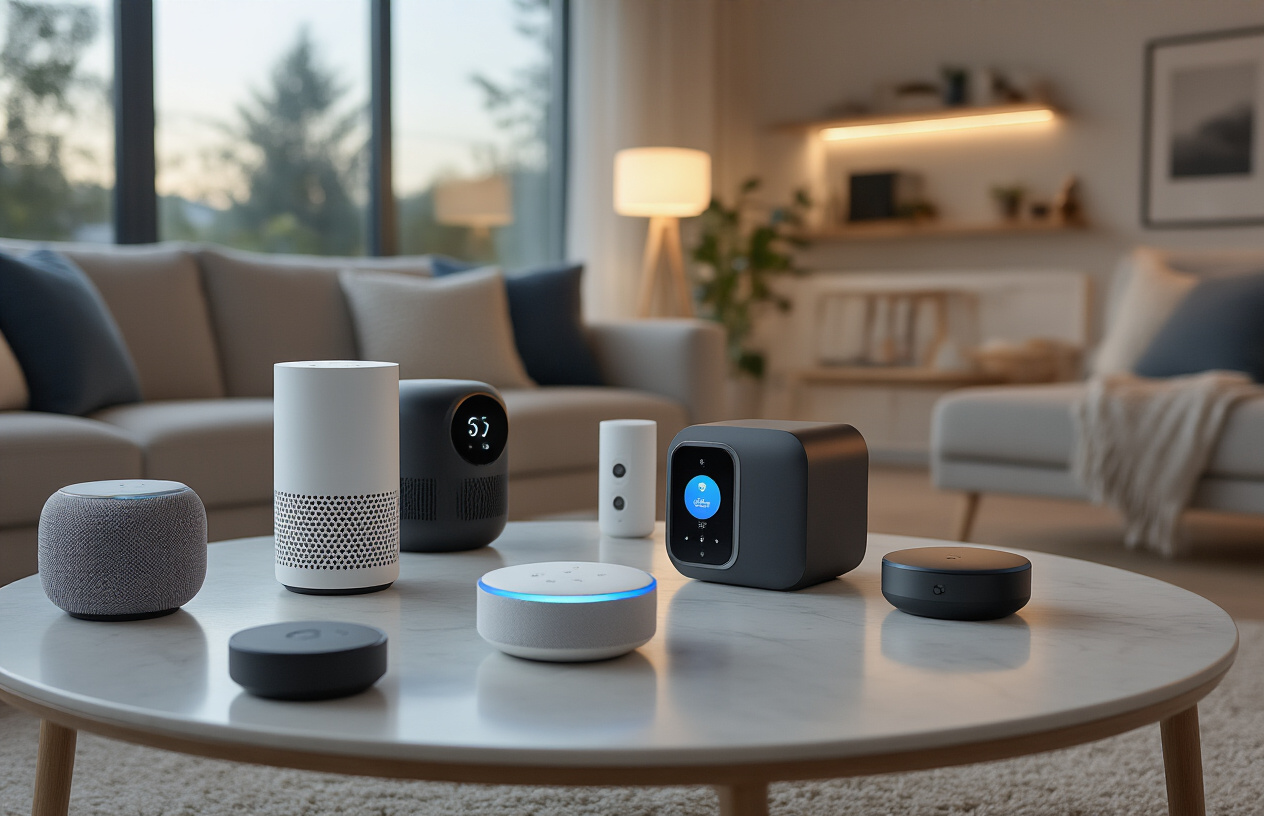
Ever felt overwhelmed staring at a drawer full of remotes while your smart lights, thermostat, and doorbell all use different apps? Yeah, me too. It’s like having a dozen personal assistants who refuse to talk to each other.
That’s where smart home hubs come in – the digital conductors that make all your smart devices play the same symphony.
I’ve spent months testing every major smart home hub on the market so you don’t have to waste your money on the wrong one. Whether you’re team Alexa, Google, or Apple HomeKit, this guide will help you find the perfect hub for total device control without the technical headaches.
But before you click “buy” on that Amazon Echo, there’s something crucial about compatibility that most reviewers aren’t telling you…
Understanding Smart Home Hubs
Understanding Smart Home Hubs
What is a Smart Home Hub and Its Primary Functions
A smart home hub acts as the brain of your smart home ecosystem, unifying disparate systems into a centrally-controlled unit. It connects and manages up to 128 devices including security alarms, lighting controls, climate systems, and water leak detection. Your hub translates between different device protocols, processes data, enables remote control via smartphone apps, and handles automation routines that make your home more responsive to your needs.
Benefits of Using a Hub for Device Control
You’ll gain significant advantages with a smart home hub at the center of your setup. The unified control eliminates the need to juggle multiple apps for different devices. Your hub enables powerful automation scenarios where devices work together automatically – lights turn on as you enter, temperature adjusts when you’re away, and security systems arm with a single tap. The hub also provides enhanced reliability through backup power options and multiple connectivity methods, ensuring your smart home stays functional even during outages.
Common Features to Look For When Buying
When selecting your smart home hub, prioritize compatibility with multiple wireless protocols like Wi-Fi, Zigbee, Z-Wave, or Matter to ensure it works with a wide range of devices. You should consider the hub’s processing power and memory capabilities, as these determine how many devices it can handle simultaneously. Look for security features including data encryption and user authentication to protect your system. Also evaluate the hub’s physical design options – from basic base stations to interactive touchscreen panels or voice-controlled assistants that match your preferred interaction style.
Major Smart Home Hub Platforms
Major Smart Home Hub Platforms
Amazon Alexa ecosystem (Echo devices)
Amazon’s Alexa leads the smart home market with exceptional device compatibility and versatile Echo speakers. Many Echo devices include built-in Zigbee hubs and Matter controllers, eliminating the need for separate hubs. Alexa Skills expand functionality beyond basic controls, letting you play music, hear news, and control thousands of compatible smart devices. With simple setup and powerful Routines feature, you can automate multiple actions simultaneously.
Google Home platform
Google Assistant powers the Google Home ecosystem, offering seamless integration with Android devices and Chromebooks. The platform excels with visual smart displays through features like Home View, built-in YouTube, and Chromecast capabilities. While having fewer integrations than Alexa, Google Home supports multi-room audio, multiple user profiles, and sophisticated translation features. The platform’s deep integration with Google services makes it particularly helpful for daily schedules and commute information.
Apple HomeKit system
HomeKit stands out for its robust security and seamless integration with Apple devices. You’ll control everything through the Home app on your iPhone, iPad, or Mac, with Siri voice commands available across your Apple ecosystem. For remote access, you’ll need a HomePod or Apple TV to serve as a hub. Though device compatibility has been more limited historically, HomeKit offers powerful automation through Scenes and Shortcuts, letting you combine multiple actions with a single command or tap.
Samsung SmartThings
SmartThings offers remarkable flexibility as an open ecosystem supporting both Zigbee and Z-Wave standards. You’ll appreciate its stability and comprehensive device support, making it ideal if you already own Samsung appliances or TVs. While not the most intuitive system to set up, SmartThings rewards your effort with powerful automations across diverse devices. As a key player in the Matter smart home initiative, SmartThings ensures your investment is future-proofed for cross-brand compatibility.
Top Smart Home Hub Recommendations
Top Smart Home Hub Recommendations
Best overall: Amazon Echo (4th gen)
You’ll find the Amazon Echo (4th gen) offers exceptional smart home control with Bluetooth, Wi-Fi, and Zigbee connectivity. Its spherical design houses great smart home skills and an audio port for versatility. The Echo supports Alexa Guard, which listens for emergencies, and connects to Amazon Sidewalk for extended networking capabilities. With sophisticated routines and voice control, it’s perfect for managing multiple devices from different manufacturers.
Best for SmartThings: Aeotec Smart Home Hub
The Aeotec Smart Home Hub delivers comprehensive connectivity with both Zigbee and Z-Wave support, making it ideal for controlling hundreds of different devices. You’ll appreciate the functionality-rich SmartThings app that enables complex automation scenarios between your gadgets. It’s essentially the same hardware as Samsung’s discontinued SmartThings Hub but with Aeotec branding. This hub now works with Nest and Matter products for truly complete smart home integration.
Budget-friendly option: Echo Dot
At just $49, the Echo Dot gives you an affordable entry point to smart home control. While it lacks Zigbee, it connects to devices via Bluetooth and Wi-Fi with ease. You’ll still get powerful Alexa routines, including Alexa Guard for security monitoring. The Echo Dot supports Matter and even functions as an extender for eero mesh Wi-Fi systems, making it an excellent value for those starting their smart home journey.
Best for Apple users: HomePod/HomePod mini
For your Apple ecosystem, the HomePod and HomePod mini serve as perfect HomeKit hubs. The HomePod (2nd generation) supports Matter and includes temperature and humidity sensors for additional automation capabilities. You’ll appreciate its ability to listen for smoke and carbon monoxide alarms, sending alerts when detected. While the HomePod delivers exceptional sound quality, the more affordable HomePod mini offers many of the same smart home features in a smaller package.
Best for Google ecosystem: Nest Hub Max
Your Google-centric smart home will benefit from the Nest Hub Max’s expansive 10-inch display and Thread connectivity. You’ll enjoy viewing security camera feeds, controlling devices with on-screen interfaces, and making video calls with its camera that follows you across the room. While Google Home’s smart home capabilities aren’t as extensive as Alexa’s, the Nest Hub Max excels with entertainment options and intuitive touch controls for your connected devices.
Best for power users: Hubitat Elevation
For your advanced smart home needs, the Hubitat Elevation delivers unparalleled control with both Zigbee and Z-Wave antennas. You’ll appreciate its incredibly specific rules and automation capabilities through the web interface. While it has a steep learning curve, power users will love the granular control it provides. The hub stores all logic locally for enhanced privacy and reliability, though you’ll need to connect it directly to your router since it lacks Wi-Fi connectivity.
Smart home hubs have revolutionized the way we interact with our living spaces, offering seamless control over multiple devices through a single interface. Whether you prefer Amazon’s Alexa ecosystem, Google Home’s intuitive integration, Apple HomeKit’s security features, or Samsung SmartThings’ versatility, your choice should align with your existing devices and future expansion plans. Connection protocols like Zigbee, Z-Wave, and Wi-Fi each offer different advantages that can significantly impact your smart home experience.
When selecting your ideal smart home hub, consider factors such as compatibility with your current devices, your budget constraints, security features, and ease of use. Remember that specialized hubs for lighting, entertainment, or security might offer better performance for specific needs. By carefully evaluating these factors, you can create a smart home system that truly enhances your daily life while providing the total device control you desire.

